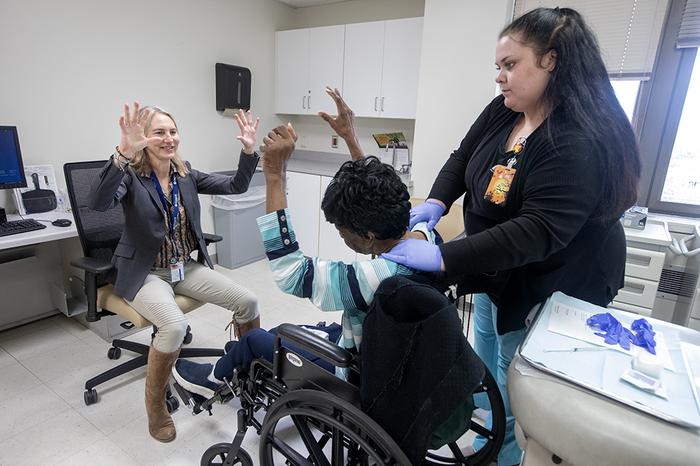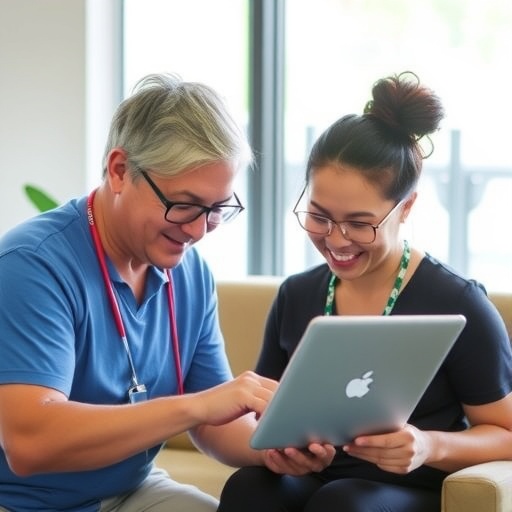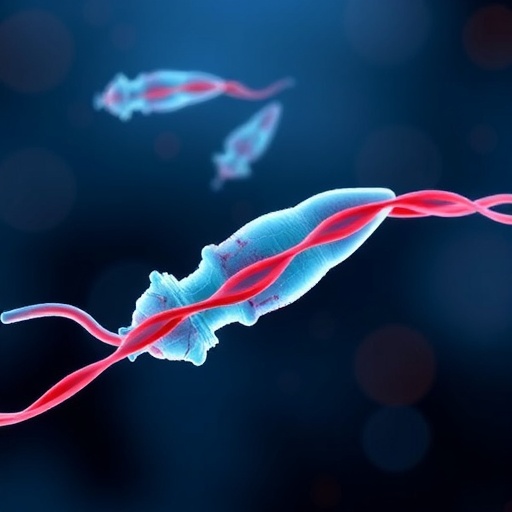The Michael J. Fox Foundation for Parkinson’s Research has chosen MUSC as one of four sites for the Black and African American Connections to Parkinson’s Disease (BLAAC PD) research study, a part of the Global Parkinson’s Genetics Program.

Credit: Medical University of South Carolina. Photo by Sarah Pack.
The Michael J. Fox Foundation for Parkinson’s Research has chosen MUSC as one of four sites for the Black and African American Connections to Parkinson’s Disease (BLAAC PD) research study, a part of the Global Parkinson’s Genetics Program.
BLAAC PD will explore the genetic basis of Parkinson’s disease (PD) in the Black community by genotyping more than 150,000 people worldwide, setting the stage for the development of targeted treatments. According to the Parkinson’s Foundation, approximately 36,265 people with PD live in North Carolina and South Carolina.
Vanessa Hinson, M.D., Ph.D., director of the Parkinson’s Disease Foundation Center of Excellence at MUSC, will be the principal investigator for the MUSC site of the BLAAC PD study.
“When this opportunity came about for BLAAC PD to specifically look at and serve the Black and African American population, I thought that this was something our state should be doing, given that about 26.3% of South Carolinians are of that ancestry,” she said.
Studies have shown that PD can manifest in various ways due to differences in genetic mutations and subtypes. Specifically, people of African ancestry displayed a mutation that quadruples the risk of getting PD and is not seen in people of European ancestry. Delivering treatments that are specific to this subtype of PD could improve these patients’ outcomes.
“If we could undo what goes wrong in a person’s brain who has such a gene by delivering a targeted treatment to that particular gene mechanism, then we would potentially be able to halt the progression or reverse the Parkinson’s issue directly,” she said.
The mutation that has already been identified in people of African ancestry is associated with a higher risk for cognitive impairment in PD. This novel finding creates a pathway for equity by laying the scientific foundation for targeted treatments that could improve cognition and memory for patients with PD in the Black community. BLAAC PD will also continue to look for other mutations implicated in PD in the Black population.
Hinson is proud that MUSC will be a site for BLAAC PD because she believes it will build community and create awareness of Parkinson’s disease research in Black and African American communities. To get the word out about the study, she will work with community champions as well as primary care providers statewide who are affiliated with MUSC Health’s Regional Health Network.
“It’s about building trust and making sure people understand that MUSC is accessible,” explained Hinson.
# # #
About MUSC
Founded in 1824 in Charleston, MUSC is the state’s only comprehensive academic health system, with a unique mission to preserve and optimize human life in South Carolina through education, research and patient care. Each year, MUSC educates more than 3,200 students in six colleges – Dental Medicine, Graduate Studies, Health Professions, Medicine, Nursing and Pharmacy – and trains more than 900 residents and fellows in its health system. MUSC brought in more than $298 million in research funds in fiscal year 2022, leading the state overall in research funding. MUSC also leads the state in federal and National Institutes of Health funding, with more than $220 million. For information on academic programs, visit musc.edu.
As the health care system of the Medical University of South Carolina, MUSC Health is dedicated to delivering the highest-quality and safest patient care while educating and training generations of outstanding health care providers and leaders to serve the people of South Carolina and beyond. Patient care is provided at 16 hospitals (includes owned and equity stake), with approximately 2,700 beds and four additional hospital locations in development; more than 350 telehealth sites and connectivity to patients’ homes; and nearly 750 care locations situated in all regions of South Carolina. In 2022, for the eighth consecutive year, U.S. News & World Report named MUSC Health University Medical Center in Charleston the No. 1 hospital in South Carolina. To learn more about clinical patient services, visit muschealth.org.
MUSC has a total enterprise annual operating budget of $5.1 billion. The nearly 26,000 MUSC family members include world-class faculty, physicians, specialty providers, scientists, students, affiliates and care team members who deliver groundbreaking education, research, and patient care.
Method of Research
Randomized controlled/clinical trial
Subject of Research
People




